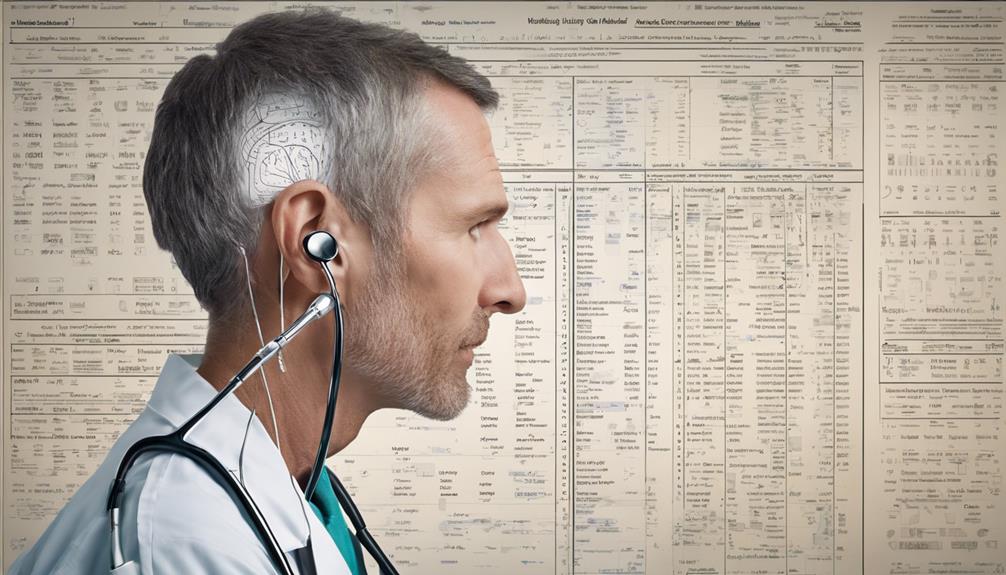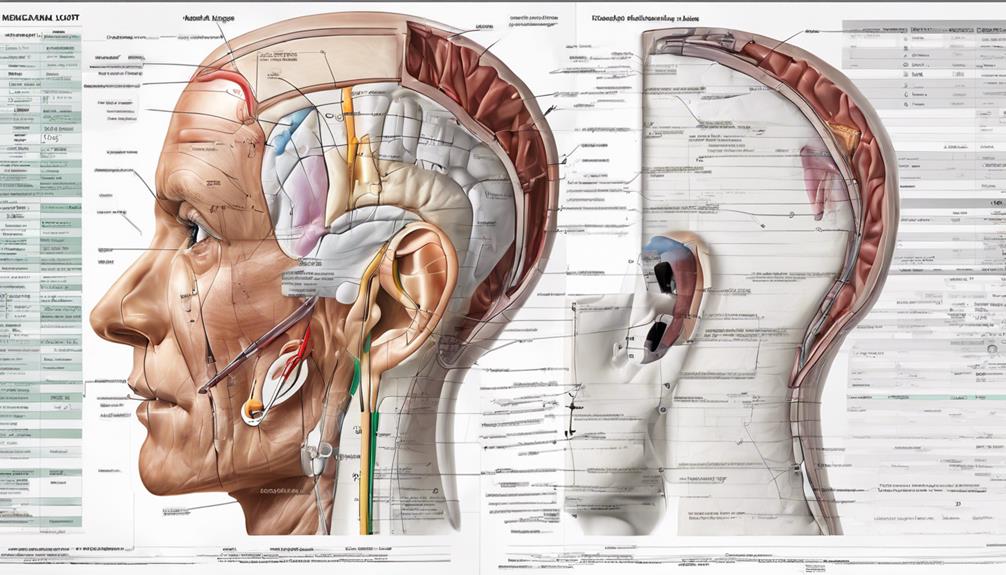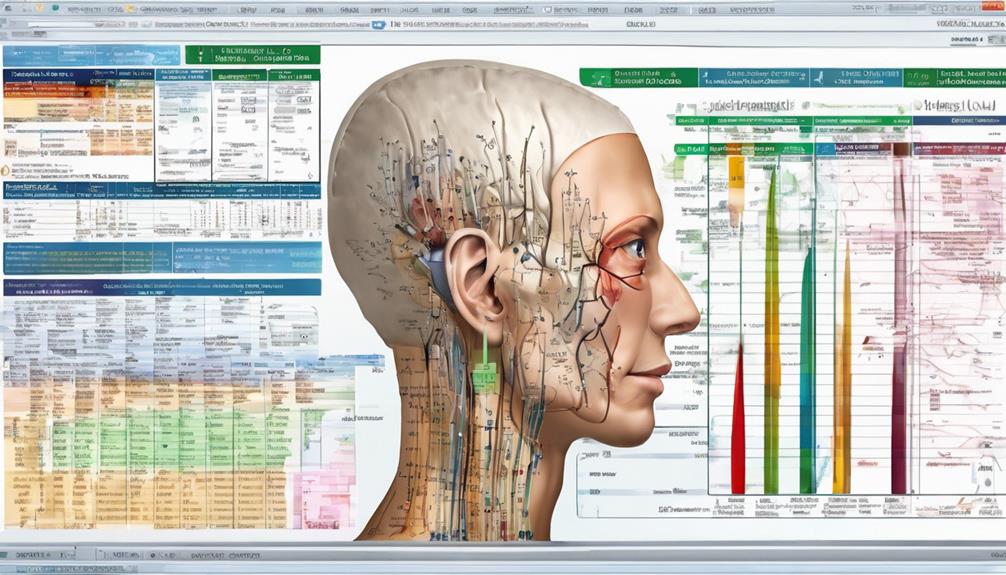Navigating through the complexities of ICD codes to find the accurate code for left ear hearing loss may feel like unraveling a challenging puzzle. But fear not, as we break down the intricacies of ICD-10-CM coding for this specific condition, shedding light on the details that ensure precision in medical documentation.
From understanding the nuances of classification to practical tips that streamline the coding process, our exploration will equip you with the tools needed to conquer the challenges of assigning ICD codes for left ear hearing loss.
Key Takeaways
- Ensure accurate coding with ICD-10-CM guidelines and detailed documentation.
- Understand Excludes1 conditions to avoid coding errors.
- Familiarize with chapter-specific guidelines for left ear hearing loss coding.
- Consult coding professionals for assistance in precise ICD code selection.
ICD-10-CM Coding Basics
In mastering the ICD-10-CM coding basics, we navigate a system that provides a structured framework for accurately documenting and coding various health conditions. When it comes to hearing loss in the left ear, using the correct ICD-10-CM code, such as H91.92 for unspecified hearing loss, is crucial. Proper documentation plays a significant role in ensuring accurate coding for conditions affecting the left ear. Chapter-specific guidelines offer detailed instructions on how to assign ICD-10-CM codes for different types of hearing loss, helping us make precise code selections.
Understanding Excludes1 conditions is essential in coding for left ear hearing loss. Conditions like impacted cerumen and noise-induced hearing loss fall under Excludes1, meaning they shouldn't be coded together with certain other conditions. Additionally, utilizing crosswalks can aid in transitioning from ICD-9-CM to ICD-10-CM, facilitating a smooth shift in coding practices for left ear hearing loss. By following these guidelines and utilizing the resources available, we can ensure accurate coding for patients with hearing impairments in the left ear.
Understanding Hearing Loss ICD Codes

Navigating the structured framework of ICD-10-CM coding, we encounter the importance of understanding and correctly applying the specific codes for hearing loss in the left ear. Here are some key points to consider:
- ICD-10-CM Code H91.92: This code is specifically designated for unspecified hearing loss in the left ear, falling under the classification of Diseases of the ear and mastoid process.
- Proper Documentation: Accurate assignment of ICD-10-CM code H91.92 relies heavily on detailed and precise documentation of the patient's condition and medical history.
- Excludes1 Conditions**: Conditions such as impacted cerumen and psychogenic deafness are excluded from being coded with H91.92, emphasizing the need to understand and apply Excludes1 notes correctly.
- Understanding Excludes1 Notes**: To ensure accurate coding of hearing loss in the left ear, healthcare professionals must familiarize themselves with Excludes1 notes to avoid coding errors and maintain coding integrity.
Coding Guidelines for Left Ear Hearing Loss

When assigning ICD codes for hearing loss in the left ear, it is crucial to adhere to the specific coding guidelines provided in the ICD-10-CM manual. Proper documentation plays a key role in accurately coding left ear hearing loss. Excludes1 conditions, such as noise-induced hearing loss and impacted cerumen, should not be coded with H91.92, the ICD-10-CM code for unspecified hearing loss in the left ear. Crosswalks are available to aid in transitioning from ICD-9-CM to ICD-10-CM for left ear hearing loss. Chapter-specific guidelines offer detailed coding instructions for H91.92 in the manual.
| ICD-10-CM Guidelines | Left Ear Hearing Loss | Documentation |
|---|---|---|
| Follow Chapter-specific | Code: H91.92 | Ensure accuracy |
| Check for Excludes1 | Avoid noise-induced | Detailed and comprehensive |
| Utilize Crosswalks | Do not code cerumen | Essential for coding |
| Refer to Manual | Chapter-specific info | Crucial for proper coding |
Common ICD Codes for Left Ear Deafness

As we explore the realm of left ear deafness, it's essential to understand the array of common ICD codes associated with this auditory condition.
- ICD-10-CM Code for Left Ear Deafness: The specific ICD-10-CM code for unspecified hearing loss in the left ear is H91.92.
- Excludes1 Conditions**: Conditions excluded from H91.92 include abnormal auditory perception and noise-induced hearing loss.
- Crosswalks for Transition: Crosswalks are valuable tools available for transitioning from the older ICD-9-CM coding system to the new ICD-10-CM system.
- Importance of Proper Documentation**: Proper documentation is crucial to ensure accurate coding for hearing loss in the left ear and to avoid errors in coding selection.
Understanding Excludes1 notes is vital for selecting the appropriate ICD-10-CM code, and utilizing crosswalks can aid in the transition between coding systems. Proper documentation is the cornerstone of precise coding for left ear deafness, ensuring accurate representation of the patient's auditory condition.
Tips for Accurate ICD Code Assignment

For accurate assignment of ICD codes pertaining to hearing loss in the left ear, it is imperative to document specific details such as unilateral or mixed qualifiers and contralateral hearing status. Understanding the nuances between unilateral and mixed hearing loss is crucial for precise coding. Additionally, considering the contralateral hearing status, whether it is normal or impaired, plays a vital role in selecting the correct ICD code. Familiarizing oneself with Excludes1 and Excludes2 notes related to hearing loss codes can help prevent coding errors. Consulting with audiology or coding professionals can provide valuable guidance in determining the most appropriate ICD code based on the documented information. To further illustrate the importance of these considerations, below is a table highlighting the key differences between unilateral and mixed hearing loss:
| Qualifiers | Unilateral | Mixed |
|---|---|---|
| Description | Hearing loss only in one ear | Hearing loss in one ear and partial loss in the other |
| Coding Example | H90.41 | H90.42 |
| Contralateral Status | Not considered | Considered |
Frequently Asked Questions
What Is the ICD-10 Code for Hearing Loss in the Left Ear?
We know the ICD-10 code for hearing loss in the left ear is H91.92. It's crucial to document properly for accurate coding.
Understanding Excludes1 conditions is key for precise coding.
What Is the ICD-10 Code for Left Ear Sound?
When assigning an ICD code for left ear sound, it's important to consider the specific nature of the sound. Documenting details like the type, frequency, and severity of the sound can help accurately assign the appropriate code.
Proper documentation is key in coding for auditory symptoms to ensure the correct ICD-10 code is applied. Following coding guidelines diligently will aid in precise coding for left ear sound-related conditions.
What Is the ICD-10 Code for Failed Hearing Screen Left Ear?
We understand the importance of accurately coding failed hearing screenings in the left ear. Using the specific ICD-10 code H91.90 for this scenario aids in precise medical record keeping.
Properly assigning this code allows for tracking and addressing potential hearing issues efficiently. Healthcare providers and coders must grasp the significance of utilizing ICD-10 code H91.90 for a failed hearing screen in the left ear to ensure proper diagnosis and treatment.
What Is the ICD-10 Code for Sensorineural Hearing Loss Unspecified?
We use the ICD-10 code H90.3 for sensorineural hearing loss unspecified. This code covers cases where the specific type of sensorineural hearing loss isn't provided. It falls under Diseases of the ear and mastoid process.
Proper diagnosis documentation is vital for accurate coding with H90.3. It's crucial to ensure specificity in diagnosis to correctly assign this ICD-10 code for sensorineural hearing loss unspecified.
Conclusion
In conclusion, assigning the correct ICD code for hearing loss in the left ear is crucial for accurate medical coding.
Just like a skilled navigator uses a map to reach their destination, healthcare professionals must follow guidelines and utilize resources to ensure precise coding practices.
By staying informed and adhering to established protocols, we can effectively document and code for left ear hearing loss with confidence and accuracy.










